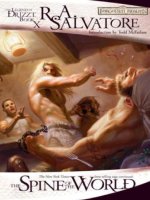WORLD BOOK WORLD BOOK WORLD BOOK 0164 0164
Bạn đang xem bản rút gọn của tài liệu. Xem và tải ngay bản đầy đủ của tài liệu tại đây (1.1 MB, 1 trang )
Prusha, the Thakal
Khitus was built upon the backs of thakal beasts, as ordained by their great god Prusha. She is the mother of
her kind, the bestower of strength and endurance. She
favors obedience and cooperative effort and that which is
built by brute force. Teamsters who drive thakal and the
riders who mount them, even those who are not believers, invoke Prusha’s name in the mastery of their animals.
A sacrifice to Her at the beginning of any thakal-dominated endeavor, be it the hauling of stone or a charge
of cavalry, is a common ritual. Prusha is a long-departed
god who has never been entirely forgotten on Khitus.
Clergy of Prusha
Prushan Shadazim insist that thakal deserve the honor of
difficult labor and that humans and others are unworthy of
it. They shun physical endeavors and allow themselves to
grow physically weak as a demonstration of their belief. They
honor the thakal and its strength while allowing their own to
deteriorate. Priests are slim and emaciated. However, since
thakal brutes are unsuited to many tasks that the Prushan
priests feel they cannot perform, they employ slaves to take
up the slack. Bondage beneath these priests is reputedly
harsh and unforgiving, where one is treated no differently
than an animal, collared and beaten, fed by the trough.
Rutchu, the Red Man
Shadazim depict Rutchu either as a smooth-skinned
gargantuan with fangs and razor-sharp claws or as a
The Prophet
While the fervent that follow the Prophet deem him
equal to gods (or at least the priests of the old gods),
they exaggerate to raise their own self-worth. The
Prophet is neither a Shadazim nor has he ever wished
such. He neither claims to be a god nor claims any
connection to any god or gods. He does not deliver
any sort of divine message from an external being.
The Prophet presents himself as a mortal with a compelling new philosophy of universal love and brotherhood. Misinterpretations of that message are already
beginning to dilute and confuse things, but the original
teachings are mundane rather than divine.
Still, many gods and their Shadazim look down upon
Khitus with jealousy at those who speak of the Prophet,
wishing for the ardent worship directed toward them . .
. and the power that comes from it.
162
hunched brute with a beard and hair of living flame.
He always appears muscular, naked, and grinning. The
Red Man is a lustful miscreant that embodies theft and
skulking magic. Worshipers reach out to him to hide their
clandestine affairs and to blind others to their theft and
treachery. The “Red Righteous” prize those things they
obtain illegally or immorally, wearing them proudly.
Rutchu is also the gamester, the gambler, and the cheat.
Tradition holds that Rutchu lives in the hearts of all
people, lurking there until a moment of temptation
summons Him forth. Anyone who has secretly wished
for misfortune to befall another has “tickled the Red
Man’s toes.” He has cut the throats of a million millions,
it is said, or at least provided the knife to others who did
his bidding. Attite tradition attributes chance happenings that shift battles to Rutchu, so they sacrifice blood
and gambled winnings to Him prior to the march. Flesh
reddened by the sun is thought to bring out the treacherous gambler in otherwise honest men.
Clergy of Rutchu
Rutchu’s priests wear large, deep hoods or even dark
masks to hide their eyes and keep their identities secret.
Only other clergy know exactly who they are, and they
often pass anonymously when not on official duty. “Passing the red dot,” often on a scrap of papyrus or ragged
cloth, notifies those in the know to set up a gathering
either to worship or help the priests work some of their
nefarious magic.
Small, covert altars or temples to the Red Man exist
along roads and trails, wherever passersby find hidden
spots from which they might waylay other travelers.
While some might be large enough for up to a dozen
folk to enter, most are little more than sheltered niches
marked by a flame-circled red hand. Here they leave
small trinkets stolen from the unsuspecting to garner the god’s favor . . . or give up items of some worth
to appease the Red Man and protect themselves from
Rutchu’s faithful.
Tribal Gods
Some gods have tribal origins and significance.
Sang-Tao is the Attite creator god who made them; all
the world’s mountains are their sad god’s bones. Chindi
worship Mangkir as a god, though even many among
them think Mangkir was merely a mortal Daragkark.
The Pajalu god who they believe made the Dragon
Kings, Ardhana, eventually drove those creatures from
Khitus. Among the Pachyaur, Mulngul will return because his Shadazim keep reciting passages from his
Books of the Moons.









